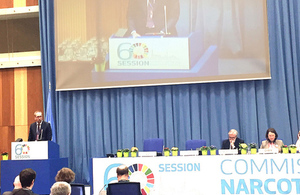UK National Statement to the 60th UN Commission on Narcotic Drugs
Delivered by Andrew Johnson, head of drugs and alcohol unit (Home Office), United Nations Vienna, 14 March 2017

UK statement being delivered
Chair,
The United Kingdom is delivering a modern, balanced and evidence-based response to drugs within the UN conventions.
We have seen a reduction in drug misuse among adults and young people compared with a decade ago, and more adults are leaving treatment successfully compared to 2010. However, there is still work to be done.
We are developing a new Drug Strategy, which will be published soon.
The strategy will facilitate a multi-agency, joined-up approach, ensuring that individuals have access to the wide range of services essential to recovery.
For the first time in a United Kingdom drug strategy, there will be a chapter dedicated to global action. This will cover our leading role in shaping international drugs policy, sharing evidence through our global networks, and promoting human rights.
Chair,
At the UN General Assembly Special Session on Drugs 2016 the international community once again came together to strengthen our consensus on drug policy.
The United Kingdom welcomes the Commission’s initial work to monitor Outcome Document implementation through intersessional meetings which are structured around the seven chapters of the Outcome Document.
We would welcome the future work of the Commission on this issue being structured along similar lines.
Chair,
To help implement the Outcome Document recommendations on new psychoactive substances, the United Kingdom has tabled a resolution at this Commission.
The United Kingdom’s resolution will focus on addressing the health harms of these substances.
The resolution encourages Member States and international organisations to develop and share information on tailored treatment responses, and to strengthen data collection on the health harms of these substances.
The United Kingdom looks forward to agreeing this resolution and working with partners to implement it.
Chair,
As well as implementing the Outcome Document recommendations, it is important that the Commission monitors implementation.
A key forum for this is the International Action Group on new psychoactive substances. This informal network of over 30 governments and organisations helps to coordinate and drive the global response to these substances.
Members of this group have prepared a report on action they are taking to implement the Outcome Document’s recommendations on this issue, which has been circulated to the Commission.
Chair,
The United Kingdom has a proud history of championing human rights, and in this regard we oppose the use of the death penalty in all circumstances as a matter of principle.
In particular, we urge all Member States who still use the death penalty for drug offences to abolish this unacceptable and ineffective practice.
We will continue to hold international agencies funded by the United Kingdom to account for compliance with their human rights obligations.
Chair,
The United Kingdom is firmly committed to supporting a comprehensive package of measures to reduce harms.
We call on all Member States to increase access to the proven interventions set out in the World Health Organisation’s 2014 Consolidated Guidelines.
Our recent £1.1 billion investment in the Global Fund to Fight AIDS, Tuberculosis and Malaria is a practical example of our commitment to ending the AIDS epidemic.
The United Kingdom has also recently announced an additional investment of up to £75 million to UNAIDS over five years from 2016 to 2021. We will continue to take a leading role on this issue.
Chair,
Up to 5.5 billion people live in countries with low or non-existent access to controlled medicines. Too many people live and die in avoidable pain.
This is why the United Kingdom will continue to invest in supporting health systems across the world. Organised crime
Chair,
To address the shared and complex problem of drug trafficking, we need to ensure we continue to strengthen law enforcement and criminal justice responses.
We also need to address the vulnerabilities which drive, enable and perpetuate organised crime.
Understanding what works is key to delivering this. We need to improve the availability and quality of impact indicators related to organised crime, so that we are better able to evaluate and improve our response.
Chair,
I will conclude by reiterating the United Kingdom’s support for a modern, balanced and evidence-based international approach to drugs within the UN conventions.
Thank you for this opportunity to address the Commission.